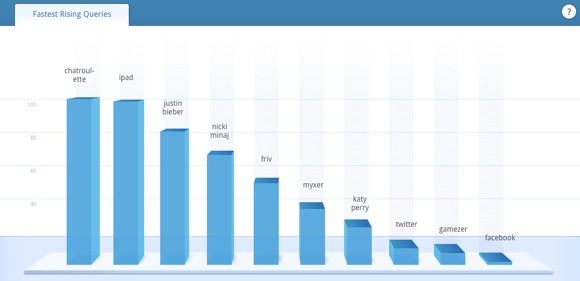For the past few years, Google has released its popular “Zeitgeist” report, in which they leverage their massive amounts of data on users’ search habits and present to us in stark numeric terms the tragedies, triumphs, and fads that sent us scouring the interwebs for more information.

Note: this graph is changing as the year 2010 draws to a close. As of this writing, iPad has inched ahead of Chatroulette for the top spot.
It’s fascinating stuff, no doubt. But after perusing and pondering the results for a while (“Wow, look how searches on the Haiti Earthquake and the BP oil spill tailed off.” “Who the hell is Nicki Minaj, and am I officially not young or hip for not knowing?”), I noticed that Google was using some pretty grandiose language to describe its Zeitgeist study. Here are a couple examples:
“Based on the aggregation of billions of search queries people typed into Google this year, Zeitgeist captures the spirit of 2010.”
“We hope you enjoy this look back to what was on the minds of Americans throughout 2010.”
These statements got the Overthinking it juices flowing. What exactly is a “zeitgeist,” and is Google Zeitgeist really that? If not, then what is it?
Your first instinct may have been to Google “zeitgeist” to get a definition, so I’ll save you the trouble and put one here to help us frame our analysis:
“The defining spirit or mood of a particular period of history as shown by the ideas and beliefs of the time.” – Oxford American Dictionary
This is where I take Google to task for playing a bit fast and loose with the use of the word “zeitgeist.” To me, Google’s Zeitgeist actually tells us very little about the actual “spirit or mood” of our times. Heck, it barely even shows us the “ideas and beliefs” of our times. It just shows us the stupid crap we’re looking for on the internet, and there’s a pretty large gulf between that stupid crap and anything approaching the spirit or mood of our times.

As this is a SFW blog, I was somewhat limited in my choices for Chatroulette screenshots
Chatroulette is not an idea or belief, nor is the iPad. Justin Bieber, for all of his popularity and 6 million followers on Twitter, is a pop singer. Now, are all of these parts of larger societal trends? Sure, one could easily argue that yes, all of them are. Social media, obsession with gadgets, Bieber Fever, etc. And do these larger societal trends help make up the “spirit or mood” of our times–that lofty “Zeitgeist”? Sure they do. But Google doesn’t claim that its search trends are ingredients of social trends that are part of the zeitgiest (with a little z). Google claims that its Zeitgeist (with a big Z) “captures the spirit of 2010.” Google thinks that is search trends ARE the zeitgeist (with a little z). And in doing so, it’s taking an extremely miopic view on the American psyche. According to the world of Google, we are what we search for.
There are so many things that are feeding into the true zeitgeist of the moment that just aren’t represented at all. On the Zeitgeist US page, the wars in Afghanistan and Iraq, two generation-defining conflicts with incalculable national security implications, are nowhere to be found. “Unemployment” makes the list of top 10 fastest rising news searches, but that’s the sole mention of the economy and the growing sense of malaise around America’s dimming prospects for prosperity.
Now, I’m not complaining that Americans don’t care about these issues (they clearly do, at least about the economy). I’m not even complaining that Americans aren’t using Google (and the internet) enough to learn more about these things. No, I’m really complaining that Google doesn’t have either the self-awareness or humility to consider that the true zeitgeist–the spirit of the times–might not be easily captured by billions of entries into its search box and that its complex algorithms and near-stranglehold on the internet aren’t powerful enough to deduce or display what any moderately well informed citizen could tell you about the state of his/her country.
There is, of course, an alternate reading of Google Zeitgeist, which is that celebrity gossip and gadget-obsessed consumerism actually do represent the spirit of our times far better than my disjointed ramblings about American economic and security anxieties. I refuse to believe that, if for no other reason than that I see signs of that anxiety every day, in real life, in real people, and I know that anxiety runs deep, even if it’s not getting typed into a search box as often as Justin Bieber.
So Google, I have some advice for you: take out your dictionary. Review the definition of zeitgeist. Look into your soul. Look into the American soul. And next year, just call the damn thing “Top Google Search Trends of 2011,” or “Google Bieber Fever Index 2011.” I for one will appreciate your honesty.

Justin Bieber is always trending in my heart.
[Yikes, I didn’t mean for this to get so preachy at the end, but hey, sometimes it just happens! So what do you think–is the search engine tail wagging the dog? Am I just, like, totally overthinking the definition of “zeitgeist”? What’s your favorite German word that you throw into your everyday speech to make yourself sound smarter? Sound off in the comments!]
Nicki Minaj is a rapper who was rightfully lauded for her outstanding verse in Kanye West’s “Monster,” and then given too much praise for everything else she’s done.
Except that a google search for Justin Bieber is just an attempt to learn about the failing economy and possible routes back towards stability (http://www.overthinkingit.com/2010/03/23/the-musical-talmud-one-less-lonely-girl-by-justin-bieber/), reinterpreted through the lens of a celebrity obsessed culture.
That is, it captures both the economic worries and social trends of the times. Making it perhaps an even more perfect representation of the 2010 zeitgeist than just a search for “unemployment”?
Ignoring for the moment how exactly American their American analsys is, this leads onto: How do you measure the Zeitgeist?
If you are trying to measure the ideas and beliefs of what’s currently on people’s minds, then start analysing blog posts, and newspaper articles. Start counting tags (presuming things are well tagged), not searchs.
Also wonder if aggregating topics on, say, Flickr, might give an idea of what people are looking at… (although that is a subset of the tags idea.)
If Google can’t (or shouldn’t) be doing it, how can it be done?
The zeitgeist can’t be measured. Google search trends are probably not an accurate reflection of the prevailing spirit of our times because they only represent a small portion the population. Believe it or not, geeks, most people still don’t use the internet all that often. Especially older folks, who I think are also part of the zeitgeist.
I don’t pretend to understand the general themes of history at the time we’re living it, and neither should you. It’s only for history to judge, and not very well then, either. Of course I have my own opinion about todays prevailing opinions just like everyone. But no one can know if they are correct, not even the all-seeing eye of Google.
“I see signs of that anxiety every day, in real life, in real people”
This is a summary of your own personal zeitgeist, not the world or our country at large. No one has the omnipotence to see or comprehend that.
“I see signs of that anxiety every day, in real life, in real people”
This is a summary of your own personal zeitgeist, not the world or our country at large. No one has the omnipotence to see or comprehend that.
Agreed, but without getting into my day job too much, I work in number crunching/statistics for a government employment/job training program and have more of a macro view of the NYC economy than most people do. I think that can legitimately inform my own view of the larger NYC/US zeitgeist, even without rising to the level of omnipotence.
Does anyone out there have any decent examples of usage of the word “zeitgeist”? I did some research while writing this and couldn’t come up with anything satisfactory. I guess Google Books would be useful for that (side note: is that fact ironic or just strangely a propos?–call back to a past podcast) but I haven’t tried yet. This is why we need a graduate research assistant.
Well it’s clearly just an advertising thing trying to big up google – I expect they know perfectly well that it’s nonsense, but business sense obviously comes before pedantic honesty.
I think your analysis is really interesting, but you failed to analyse one aspect of the initial quotes I was hoping you would, and indeed fell into the same trap: the US does not equal the world. Perhaps Google has managed to only look at searches made in the US, but somehow I doubt it; ISPs based there, perhaps. Maybe Australia isn’t big enough to influence the results, but surely the UK would be…
Twitter released a similar thing last week. The word “Inception” was tweeted more than “Haiti.”
The methodology is all wrong, obviously. They’re basically testing for ideology, yet ideology isn’t even a variable. There’s no way of knowing why the search terms were used: One person may search for Justin Beiber because they’re a fan, another may do it because they hate him.
“One person may search for Justin Beiber because they’re a fan, another may do it because they hate him.”
that’s kind of the point of zeitgeist, isn’t it? stuff people get all kinds of excited for to be completely forgotten in five or ten years, i think Bieber is a perfect example
I agree people get excited about a zeitgeist, but if this list is supposed to determine the MINDSET of the country, only including search terms doesn’t cut it. Listing off searches only says what was being searched for, not why- the MINDSET behind the search, the very thing Google claims to know, is lost. A fan OR non-fan of Beiber cares in some way, somehow, when searching for him, yes, but those ways are different and have entirely divergent motivations from/to that search term of “Justin Beiber.”
Today, Merriaum-Webster released their list of most-searched words, and I think it fits better for what I’ve been experiencing in the last year or two.
1. austerity
2. pragmatic
3. moratorium
4. socialism
5. bigot
6. doppelganger
7. shellacking
8. ebullient
9. dissident
10. furtive
In my thinking, it almost feels like “zeitgeist” is actually not going on right now. I suppose there may be, but it’s so hard to analyze a period of history while you’re in the middle of it. Certainly the obsession with pop culture as a means of escaping the economic doldrums may be part of it. Yet the word always carries to me that there’s a more unified feeling than I ever really get a sense of. I’d posit that there was a certain zeitgeist for the followers of Obama up to the point he was elected (and maybe a bit after). Of course, that’s more my interpretation of the word, and I’m not a dictionary. :D
It may be important to consider just who’s doing the searching. Those with a vested interest in the socio-economic climate likely have direct access to their information. It’s no stretch to think someone looking for market data goes straight to Bloomberg rather than to the Google search bar. Where your 13 year old cousin looking for Beiber stickers to cover her iPad is much more likely to rely on Google.
Granted, this doesn’t account for Google’s ego in assuming their engine contains the mercury for the social thermometer but that, well, I’ve got no opinion on that.